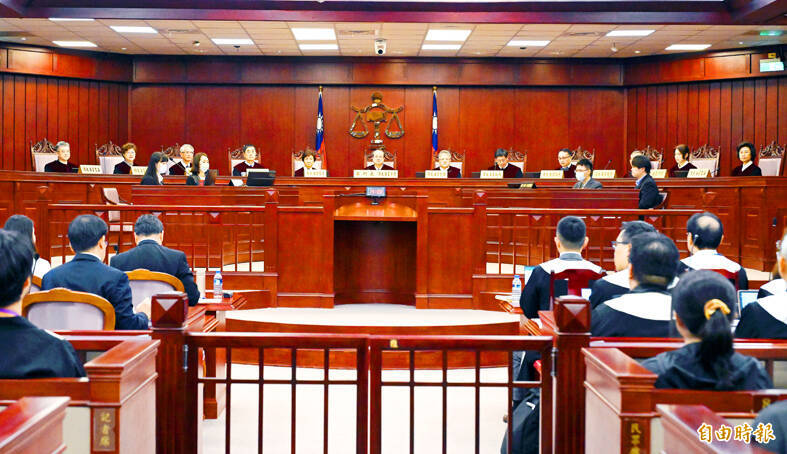《TAIPEI TIMES》 Death penalty debated at court

Justices of the Constitutional Court hear arguments on abolishing the death penalty in Taipei yesterday. Photo: Liao Chen-huei, Taipei Times
By Shelley Shan / Staff reporter
Supporters and opponents of abolishing the death penalty yesterday engaged in heated debate at the Constitutional Court.
Twelve of the 15 justices heard arguments from the legal team representing 37 inmates on death row and legal experts advocating the removal of the death penalty, as well as from Ministry of Justice officials and experts opposing the move.
Justices Tsai Jeong-duen (蔡? 燉), Tsai Tsai-chen (蔡彩貞) and Yu Po-hsiang (尤柏祥) recused themselves for having defended inmates on death row.
Judicial Yuan President and Constitutional Court Chief Justice Hsu Tzong-li (許宗力) announced that the court would spend three months deliberating the issue, adding that it could be extended by another two months if necessary.
Attorney Lee Hsuen-yi (李宣毅) in his opening statement said that his grandmother was killed in a robbery and he had a strong desire to kill the perpetrator himself, but eventually realized he should explore the reasons that cause people to commit crimes.
The death penalty is the government’s way of avoiding taking care of victims, he said.
Attorney Nigel Lee (李念祖) said it has yet to be proven that the death penalty deters crimes and offers retributive justice to victims.
“The death penalty is a cruel and unusual punishment. In practice, death sentences could be meted out unreasonably,” he said. “If the law does not allow people to resort to violence to resolve a violent crime, then judges should have no right to do so either.”
Nigel Lee’s son and cocounsel Lee Chien-fei (李劍非) said protecting people’s right to existence should be decided by the court not the legislature.
“Whether the death penalty should be abolished is not merely a ‘yes’ or ‘no’ question. The question should be: Is there is an alternative to capital punishment? A Ministry of Justice survey showed that Taiwanese could support abolition if there are supporting measures,” he said.
National Taiwan University law professor Yen Chueh-an (顏厥安) said that the justices represent the public, as they are appointed by the president and approved by the legislature.
There should not be any major issue allowing the justices to resolve the matter of the death penalty, he said.
By contrast, Ministry of Justice Department of Prosecutorial Affairs Director-General Kuo Yung-fa (郭永發) said that the Constitutional Court has always ruled that the death penalty is constitutional.
The death penalty is handed down based on the principle of culpability and shows that people must be responsible for their actions, he said.
In the past five years, there have been 476 homicide cases, and only one case resulted in a death sentence, Kuo said
The crimes subject to the death penalty include murder or homicide after forced sexual intercourse, robbery or kidnapping, which are the most serious crimes, Kuo said.
Japan and South Korea have also found the death penalty constitutional, he said.
In Taiwan, offenders are protected by a series of procedures before they can be sentenced to death, including compulsory defense and appeals, he said, adding that judges sentence based on objective standards.
National Chung Cheng University criminology professor Edward Lai (賴擁連) said that using life imprisonment with the possibility of parole is unfeasible.
“Situations in Taiwan have shown a high recidivism among those who were sentenced to a number of years in prison, which also shows that such a method cannot deter crime,” Lai said.
The Association of Victims Support said that it had conducted a survey before attending yesterday’s proceedings.
“The families of two police officers killed in Tainan while capturing a fugitive in 2022 said that they hope the court would understand the pain they felt after losing their children. The death penalty should not be abolished before the public is persuaded that it is necessary,” the association said.
In the afternoon session, justices Remington Huang (黃瑞明), Jan Sheng-lin (詹森林), Hwang Jau-yuan (黃昭元), Hsieh Ming-yang (謝銘洋), Tsai Tzung-jen (蔡宗珍) and Judy Ju (朱富美) posed questions to both teams.
Jan asked the legal team representing inmates on death row if they think the death penalty would be constitutional if the evidence against the offenders is substantial, such as the cases of a stabbing spree on the Taipei MRT in 2014 or the decapitation of former New Power Party Chairwoman Claire Wang’s (王琬諭) daughter in Taipei’s Neihu District (內湖) in 2016.
“I want to ask counselor Lee [Hsuen-yi] because you speak from your personal experience that we should not sentence perpetrators to death, but rather explore reasons why they committed crimes in the first place,” Jan said.
“I am sure many people would admire you for having such an open mind, but do you expect all families to think like you do?” he asked.
Jan also asked justice ministry officials why they asked the grand justices to compromise their values by considering public opinion about the death penalty.
“Before we declared unconstitutional the ban on same-sex marriage, criminalization of adultery and divorce from spouses who have had extramarital affairs, you had also said that they were constitutional and asked us to respect the legislative and executive branches. Why do you want us to give in on this matter?” Jan asked.
Kuo said that the previous issues concerned freedom of choice and cannot be compared with the death penalty, which involves greater public interest.
新聞來源:TAIPEI TIMES












